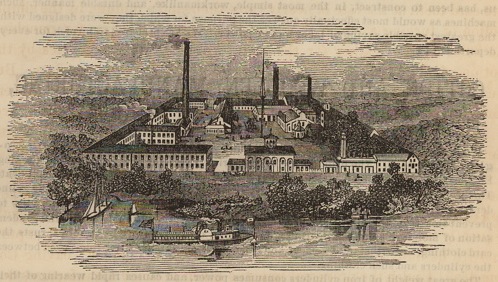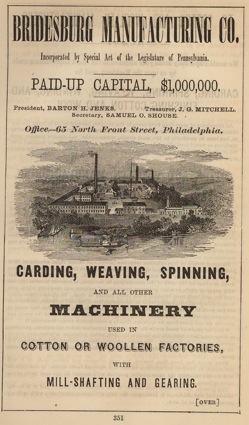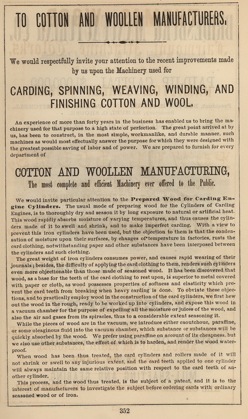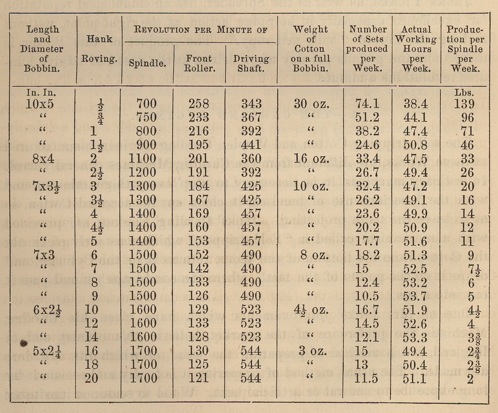
Bridesburg Manufacturing Co.
[East side of Richmond Street between Franklin & Locust, Philadelphia PA]
—© Edwin T. Freedley,
Philadelphia
and its Manufactures (1867), pp. 351-351 &
587-592.
"These works, of which we
have already given the incidents connected with their
establishment and early history, are located at
Bridesburg, a flourishing town now constituting a part of
the city of Philadelphia. They are built in the form of a
bollow square, cover an area of one hundred and sixty
thousand square feet, and consist of a Foundry one
hundred and thirty by fifty feet; a Blacksmith shop, one
hundred and twenty by fifty feet, having eighteen forges
and four trip-hammers, for making, in addition to other
things, Bolts-of which seven hundred are made and used in
the machinery work daily; a buildidg one hundred and
ninety by thirty-two feet, containing an apartment used
as a Brass Foundry, and also for "cleaning" the castings
after they have been subjected to the process of
"pickling," and a well-adapted room for storing patterns
when not in use. The Machine Shop is a building two
hundred and twenty-five by thirty-eight feet, and the
large structure formerly used as an armory, occupying the
entire southern front, is now fitted up exclusively for
making Ring Spinning Frames, and one frame of two hundred
and four spindles is turned out daily. A capacious
Elevator is employed for raising and lowering castings
and other objects between the different stories of the
Machine Shop; and a Railway connects this and the
Foundry. The Carpenter Shop is a building one hundred and
sixty-eight by thirty feet, three stories high; and each
of the various rooms and departments is supplied with
tools and machinery of the most perfect construction,
peculiarly adapted to the purposes for which they are
designed. In the Wood-working Room are two of Daniel's
Planing Machines, and one of Woodworth's, and Moulding
and Sawing Machines capable of facilitating and making
more perfect the woodwork required for the Carding
Engines, Looms, etc. All the wood used is kept for the
space of two years before being shaped by the machinery,
so as to properly season it, and after it has been thus
seasoned and brought to the form desired, it is placed in
a commodious Drying-bouse, entirely fire-proof, and
always kept by the heat of steam at a temperature of
seventy-five degrees, for the purpose of being still more
thoroughly seasoned. The tools and Machinery for
performing the work in the several shops are mostly made
by their own workmen; among which may be classed several
Drills of new and improved construction, Boring Mills,
and other self-acting machines, of the most beautiful
design and perfect workmanship.


"To attempt a recital of the various useful and novel
Machines made in these Works, the most important of their
class in the United States, would transcend our limits.
We shall advert to only a few of the most important which
are peculiar to the establishment, or which have received
the benefit of the improvements of Mr. BARTON H. JENKS,
who is one of the most ingenious of American inventors.
"1. LOOMS
Of Looms a large number of different styles are
manufactured at these works, ranging from the single
Shuttle, or ordinary Loom, through the more intricate
forms of two Shuttle Looms for weaving Checks; three, and
four Shuttle Looms, for weaving Ginghams and other
fabrics requiring a corresponding number of colors in the
weft, to the more enlarged Carpet Loom; and all of these
embrace, in a greater or less degree, improvements and
advantages not possessed by Looms manufactured elsewhere.
The several improvements in the Looms are covered by
seven distinct patents; and the main features
accomplished by these inventions, so far as they relate
to the two, three, and four Shuttle Looms, may be said to
consist in the expeditious manner of moving the Shuttle
Boxes to change the picks of weft; and, by certain new
constructions, combinations, and arrangements of parts
essential to this operation, and to others of an
important character, by which as many picks of weft can
be made by these two, three, and four Shuttle Looms, as
by the single Shuttle Loom. As an exemplification of
this, it may be stated, that so perfect is the
arrangement of the various parts of this latter
description of Looms, and the principle upon which they
work, that they make one hundred and thirty picks of weft
per minute, whereas the same class of ordinary Looms only
make one hundred and ten. The Muslin Loom will run one
hundred and sixty picks per minute, and produce nine
pounds of muslin a yard wide, sixty-four picks to the
inch, per day.
"2. JENKS' COTTON SPREADER.
Is made entirely of metal, thus insuring greater
steadiness and durability. The beater, shafts, blades,
and feed-rollers, are made of cast-steel; the shafts
which drive the feed are braced together in such a manner
that the teeth in the diagonal shaft cannot break; and,
by an ingenious application of the elastic principle of
air, the Machine is constructed to make the lap of
uniform thickness, and of such compactness that any
portion of it will sustain its own weight. More-over, the
whole machine works without producing any dust in the
room.
"The product of the Jenks "Spreader" is as follows: The
gallows-shaft having four hundred and fifty revolutions,
and the beaters eighteen hundred, produce per day two
thousand four hundred and ninety-six yards. Doubled on
the same machine three times, the produce will be
thirty-eight laps, each twedty-two yards long, weighing
each eighteen pounds total weight, six hundred and
eighty-four pounds. If two machines are used, the produce
will be one hundred and thirteen and a half laps per day,
each twenty-two yards long, weighing eighteen pounds in
total weight, two thousand one hundred and two pounds.
"JENKS' PICKER, as well as the Spreader, has an
established reputation for excellence, especially in
stopping action at the right point, without making the
Cotton "bally and ropy." The product of this Picker is
three thousand pounds per day when driven at the speed of
twelve hundred revolutions a minute.
"3. THE CARDING ENGINES.
The self-stripping Cotton and Woolen Carding Engines,
manufactured at these Works, are different from the
Carding Machines generally used. In ordinary machines it
is necessary to stop every thirty minutes, and with the
laborious use of band-cards clean out the secreted
Cotton, so as to leave the teeth projecting. Jenks'
Carding Engines are provided with a mechanism called a "
Self stripper," which constantly picks out the Cotton
from the bottom of the teeth, returns it to the Cylinder,
and drops it on the points of the teeth, where the combs
catch it and pass it out into a can.
"One of Mr. Jenks' improvements which have given his
Carding Machines the preference of the market, both in
this country and in England, is his method of preparing
the wood, of which the cylinders are made. The usual
method of preparing it is to dry and season it by long
exposure to natural or artificial heat. Wood so seasoned
inevitably absorbs moisture of varying temperatures, and
the cylinders of which it is made will alternately swell
and shrink, and thus make imperfect carding. To prevent
this, iron cvlinders have been used, but there are also
serious objections to their use. Mr. Jenks' plan is to
hew out the wood in the rough, ready to be worked up into
Cylinders, and then expose it in a vacuum chamber to
extract all the moisture and juices, and also all the air
and gases from its spiracles. This he accomplishes
thoroughly; then, while the wood is in the vacuum, he
introduces caoutchoue, paraffine, or some oleaginous
fluid, which the pieces quickly and fully absorb, and the
effect is to render the wood completely moisture-proof
and water-proof. His Card-Cylinders and Rollers, made of
wood thus treated, will not shrink or swell, and the
card-teeth applied to one Cylinder will always maintain
the same relative position with respect to the card-teeth
of another Cylinder.
"4. JENKS' FLY FRAME.
Is well known, and used in all factories, having the most
approved machinery. The productiveness of this admirable
Machine is given in the following Table:

"5. THE JENKS' PATENT SPINNING FRAMES.
Have the reputation of being the best in the United
States, and on the most approved system. These machines
are made with different numbers of spindles, the usual
size being a machine of two hundred and four spindles.
Each spindle will produce six skeins of number twenty
yarn, each skein weighing one-twentieth of a pound-all
weighing six-twentieths of a pound; velocity of the
spindle seven thousand turns per n-iinute, with wooden
bobbin. The spindles have a self-lubricating bolster,
which will run a month on six drops of oil. An important
coneing motion forms the bobbins with taper ends, using
paper cones on the spindles, and effecting thereby a
great saving of weight, and consequently of power in
carrying the wooden bobbins ordinarily in use. The reel
is an important machine in a Cotton Factory where the
yarn is spun to be sold in the market, and much attention
has been bestowed upon this machine by the Bridesburg
Manufacturing Company. The reel marks the skeins by an
automatic motion, and when seven skeins are marked off at
each spindle, the driving-belt is thrown off and the
machine stops. By another ingenious arrangement the
skeins are removable from the shaft of the reel without
lifting the reel, (which is the case in all the reels
excepting those made by this Company), thus enabling
smaller girls to operate the Machine.
"6. JENKS' IMPROVED CYLINDER COTTON GIN.
Is, novel for the peculiarity of the construction of the
cylinder, which operates in combination with a stationary
straight-edge and a spirally- grooved roller called "the
agitator." The straight-edge is fixed in a position
parallel with, and tangential to the cylinder, with its
thinner edge almost in contact with the upper side of the
same and the agitator, so as to rotate rapidly at a short
distance above and parallel with the straight-edge. The
periphery of the cylinder consists of numerous steel-wire
teeth imbedded in Babbitt metal, in positions inclined in
the direction of the cylinder's motion, so that after the
cylinder is "ground" or finished, each tooth presents a
separate, sharp, and smooth point, tangential to the
cylinder surface. When in operation, the cotton and seeds
are carried by the cylinder against the straight-edge,
where they are rolled over and over by the agitator,
until the teeth of the cylinder have stripped off the
fibre, the seeds immediately drop down, through a
grating, into a receiving box. The fibre is at the same
time being continually removed from the cylinder in the
usual manner, by a rotating brush behind the
straight-edge. The teeth of the cylinder are made of the
finest steel needle wire, rolled into a double razor-edge
section, and secured obliquely around the cylinder, with
their sharper edges in directions transverse to the axis
of the same ; consequently, after the cylinder is "ground
off" in finishing, it presents a serrulated surface, or a
surface studded over with innumerable sharp and smooth
tangential teeth, admirably adapted both for entering and
leaving the fibres.
"It will gin any Cotton, however trashy it may be, and
take nothing through but the lint; it neither cuts nor
naps the fibres in the least, leaving them nearly as long
as when separated by band; whilst it will clean as great
a quantity in the same time as any other Gin occupying
the same extent of space, and run as easy. It will also
last as long, if not longer, than the Saw-gin, and cost
no more for repairs.
"Besides these special machines, it may safely be said
that all of the machinery made at these Works is much
lighter, neater, and of better iron, easier to manage,
cheaper to run, and will turn off more work of equal
excellence than any English machinery ever built. Since
the close of the war, and since Cotton-manufacturing has
returned to its normal profits, mill-owners have
commenced to throw out English cards, drawing frames,
slubbers,. and speeders which they bad been persuaded or
forced to buy, and are substituting American in their
place. The whole range of English machinery is heavy and
requires great power. Their cotton machinery, unimproved
by the adoption of American inventions, is clumsy and
weighty to the degree that might be expected in a are at
their minimum value. Besides, many American improvements,
for country where steam and human labor cost but little,
and iron and coal which patents have been taken out in
England, are inaccessible to the British machine
manufacturers.
"The BRIDESBURG MANUFACTURING COMPANY has a paid-up
capital of one million of dollars, and employs five
hundred hands. The principal officers are BARTON H.
JENKS, President; JOSEPH G. MITCHELL, formerly cashier of
the Mechanics' Bank, in Philadelphia, Treasurer; SAMUEL
O. SHOUSE, Secretary. The office in Philadelphia is at 65
North Front street."
Resources:
"Bridesburg Manufacturing Co., 25th Ward,
Philadelphia, Pa.," (1866), Hexamer
#75.
"Bridesburg Manufacturing Compy.,
Bridesburg, 25th Ward, Philadelphia," (?), Hexamer
#440-441.
"Bridesburg Machine Works, Wm. F. McGill,
Bridesburg, 25th Ward, Philadelphia, Pa.," (1891),
Hexamer #2501-2502.